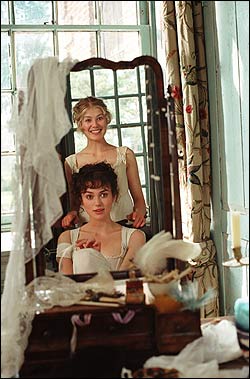There is no way to turn Jane Austen’s dialogue-based diagram of turn-of-the-19th-century exurban England and the timeless human heart into a movie. And yet that is the mission of Pride & Prejudice (which opens Friday, Nov. 11, at the Guild 45 and other theaters). Even the exemplary 1995 BBC miniseries that made Jennifer Ehle a star as Elizabeth Bennet and contributed both the classics-crazy screenwriter Andrew Davies and Colin Firth’s Darcy to the Bridget Jones movies inevitably misses the mark. Or rather, hits an entirely different mark. Its largeness fails to contain the novel’s multitudes, but it’s a heavenly five hours one never wants to end, except that one’s desperate to see the foregone conclusion of betrothal. As Martin Amis notes, “Jane Austen makes Mrs. Bennets of us all.”
And here is a new 127-minute version, only the second feature since the 117- minute 1940 P&P with Laurence Olivier and Greer Garson. Director Joe Wright (see interview) is utterly unbookish; he never read the novel, having devoted his life to reading movies intensively instead. Like protective Regency parents, starchy Austenites are howling about the outrageous liberties Wright has taken with their buttoned-up charge. How dare he give such short shrift to Lizzie’s nubile sisters! Rosamund Pike’s Jane is poised but pallid as the era’s demure ideal girl, and the others, meant to voice the available modes of womanhood, scarcely register as more than a geek chorus of squeals. Only the impulsive horndog kid sis, Lydia (sly, subversive Jena Malone) gets a proper part, perhaps because her sex-positive nature is closest to the director’s heart.
Jane’s suitor Mr. Bingley (hunky Simon Woods) is oddly played as a buffoon. So is Mr. Collins (delightfully oily Tom Hollander), the preachy, priggish, snobbish seeker of Lizzie’s hand. The effect of Wright’s massive simplification and significant alteration is to make the suitors more generic. Bingley becomes a brainless container of about £5,000 a year, more than a bishop or baronet; and Matthew MacFadyen’s rather stolid Mr. Darcy earns little more than £10,000, 5 percent of the king’s salary, making him somewhere around the 200th-richest man in England. Austen herself made about £40 a year, about as much as 2.5 paupers or four vagrants. Money was scary in Austen’s day, especially for women.
Keira Knightley’s Elizabeth is a startling departure from previous Lizzies. She’s quite like her giggly sisters, more headstrong than strong-minded and analytical. She’s supposed to finally realize she’s in love with Darcy upon glimpsing his huge Pemberton estate, which reveals his superb mental and moral administrative power—he’s Austen’s ideal guy, or capable of becoming so with the right helpmeet. Here, we’re in peril of supposing Lizzie’s a gold digger, though she’s also impressed by how nice Darcy is to his sister. When Lizzie asks Darcy whether he admired her for her impertinence, and he replies, “For the liveliness of your mind, I did,” traditional Austenites will claim this Lizzie’s mind isn’t lively at all.
I think this is to miss the point of a satisfying film. There’s much to be said for upping the sex quotient of the story, and Knightley is just the gal to bend it to such purposes. Ehle became a star as Lizzie, but an art star, intellectual, almost spectral. Never mind how Domino toppled, Knightley arrives as a true movie star, hot to trot. The 1940 version had its flaws, too—who wants to fuck Mrs. Miniver? Knightley is a Lizzie for our profane time.
Wright’s moviemaking is marvelous at many moments, a bit tipsy with the influence of Tom Jones (the movie, not the book) and Robert Altman. Busting out of the musty drawing room, he sprawls the action out into the fields and gusty rain. He embraces our modern attitude—all the pieties and proprieties of Austen’s world are stupid, power and money are ridiculous, lust conquers all, and mud on your skirt after a footrace for your heart’s prize is the symbol of all that is good, not an eyebrow-raising offence against all that is decorous.
Everyone talks over everyone else, without giving a fig for convention (or rather, in accordance with modern convention, and screw Austen’s). The bravura use of the Steadicam does serve to steady things in this chaotic mise-en-scène: We’re never at risk of chaos taking over, always an exhilarating and horrifying possibility with Altman. Instead of going for lots of montages, Wright commits to long Steadicam shots to plunge us into another century’s workaday world. Amazingly, the second ball scene even outdoes the first: Everybody remains in view, executing intricate dance steps while the still more intricate social dance is afoot. The camera swoops in with its own terpsichorean agenda, revealing character, whipping up emotion, and making it all seem enveloping and happening right now.
Granted, even if we embrace the literary heresy on its own terms and let Wright’s Austen concoction wash over us, tickling us with its bubbles, we can’t miss the flaws. Donald Sutherland seems distracted as Mr. Bennet. He doesn’t capture the character’s dark overtones, his indifference to the terrifying reality that his matchmaking-crazed wife is quite rationally wrong about. Brenda Blethyn goes over the top in this role, reflecting the movie’s barn-door-broad populism. What’s missed here is that they’re enmeshed in a bad marriage that should serve as Austen’s subtle warning to young people inclined to fall for a pretty face. As a rich lady who disapproves of Lizzie, Judi Dench also overdoes it; her fame distorts the film’s gravity field.
In the felicitous end, Wright’s P&P is all right. Sex is good, and his tale is livelier than Austen’s, if less deeply lifelike. But if I had to watch P&P again, I’d watch the five-hour version (on DVD from A&E Home Video, $39.95). It has more character.








